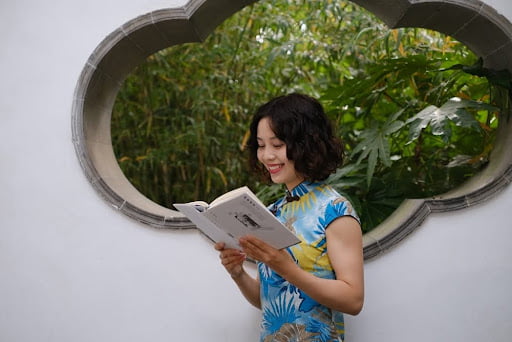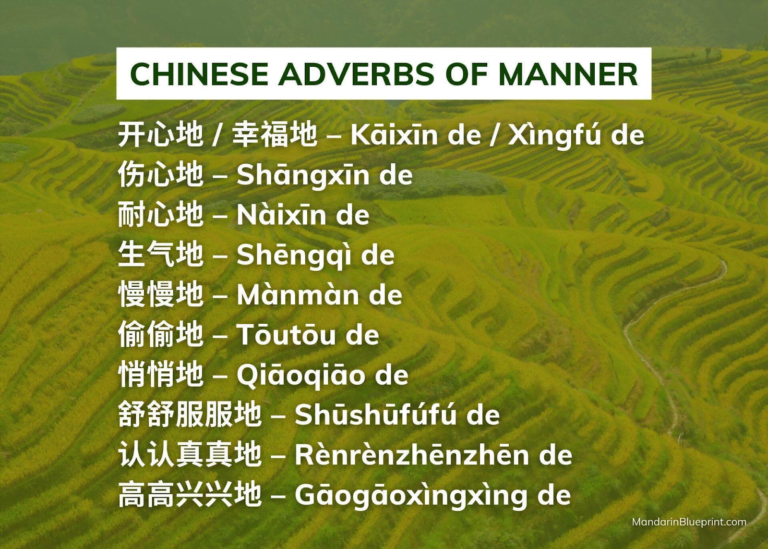Your Guide to Chinese Adverbs of Manner

Adverbs of manner in Chinese play a crucial role in adding depth and clarity to sentences by describing how an action is performed. In English, adverbs often end in “-ly” and provide insights into the manner of an action, like “quickly,” denoting speed, or “carefully,” suggesting attention to detail. Similarly, in Chinese, these adverbs give us a window into the nature of actions, enriching our understanding of the language.
A common way to form Chinese adverbs of manner is by attaching the particle 地 (de) to an adjective. This method mirrors the English practice of adding “-ly” to an adjective to create an adverb. For example, 快乐 (kuàilè), which means “happy,” transforms into 快乐地 (kuàilè de), translating to “happily” when used as an adverb. This transformation changes the role of the word in a sentence, allowing it to modify verbs instead of nouns.
The importance of 地 (de) in Chinese adverbs of manner
The particle 地 (de) is central to forming adverbs of manner in Chinese. It functions as a link between the adjective and the verb, guiding the reader or listener to understand how the verb is being acted out. For instance, in the sentence 她快乐地跳舞 (tā kuàilè de tiàowǔ), which means “She dances happily,” 快乐地 (kuàilè de) describes the manner of dancing.
Related Reading: How to Use de in Chinese – Chinese Particle 地
Now, let’s look at some real-world examples of these all-important Chinese adverbs.

开心地 / 幸福地 – Kāixīn de/Xìngfú de
开心地 (Kāixīn de) is formed by adding 地 (de) to the adjective 开心 (kāixīn — “happy”), resulting in the adverb “happily.” Similarly, 幸福地 (Xìngfú de) is derived from 幸福 (xìngfú — “happy” in a deeper, more profound sense), forming the adverb “blissfully” or “joyfully.”
The adverb 开心地 is often used to describe simple, joyful happiness, as in “她看着男人们围着桌子开心地吃饭” (Tā kànzhe nánrénmen wéizhe zhuōzi kāixīn de chīfàn — “She watched the men eating happily around the table”).
幸福地, on the other hand, conveys a deeper, more lasting sense of happiness or bliss, often used in more profound or life-affirming contexts, such as in “从此他们幸福地生活着” (Cóngcǐ tāmen xìngfú dì shēnghuózhe — “They lived happily ever after”).
In Mandarin sentences, these adverbs of manner are placed before the verb or verb phrase they modify. This placement is crucial for the clarity of the sentence, emphasizing the manner in which the action is performed.
These adverbs focus on the emotional aspect of how actions are performed, in contrast to adverbs like 快速地 (kuàisù de — “quickly”) or 慢慢地 (màn màn de — “slowly”), which describe the physical manner of actions.
The use of 开心地 and 幸福地 in Mandarin reflects the language’s ability to capture and convey different shades of happiness and joy. This capability is indicative of the expressive richness of Mandarin, allowing for nuanced communication of emotions and states of being.
Related Reading: How Sacrificing Instant Gratification Helped Me Learn Chinese Faster
伤心地 – Shāngxīn de
The Chinese adverb 伤心地 (Shāngxīn de) is formed by adding the particle 地 (de) to the adjective 伤心 (shāngxīn — “sad”), creating the adverb “sadly.” This transformation allows the adjective to be used to describe the manner in which an action is performed.
伤心地 is used to express an action carried out with a feeling of sadness. It’s particularly effective in narrative contexts to convey emotional depth, as in the example of the heroine in a novel or play: “读完他的最后一封信,她伤心地哭了” (Dú wán tāde zuìhòu yī fēng xìn, tā shāngxīn de kū l e— “After reading his final letter, she wept sadly”).
Adverbs like 伤心地 are vital for conveying the emotional state accompanying an action. They enrich descriptions and narratives by providing insight into the characters’ feelings and reactions.
The ability to express nuanced emotions through adverbs like 伤心地 reflects the expressive power of Mandarin. This capability is crucial for effective storytelling, poetry, and in any context where emotional depth is essential. Its use is key to adding emotional depth and expressiveness to descriptions and narratives in Mandarin.
耐心地 – Nàixīn de

耐心地 (Nàixīn de) is formed by adding the particle 地 (de) to the adjective 耐心 (nàixīn — “patient”), creating the adverb “patiently.” This adverb describes the manner of an action being performed with patience and endurance.
耐心地 is often used in storytelling or descriptive contexts to convey a character’s patient demeanor or approach to a situation. In the example, “她耐心地等待丈夫从上海归来” (Tā nàixīn de děngdài zhàngfū cóng shànghǎi guīlái — “She waited patiently for her husband to return from Shanghai”), the adverb 耐心地 (patiently) effectively conveys the character’s calm and enduring state while waiting.
Adverbs like 耐心地 are crucial for depicting the emotional or psychological manner in which actions are performed. They enrich the description by providing insights into the mindset or attitude of the subject performing the action.
The use of 耐心地 in Mandarin highlights the language’s ability to express complex emotional states and attitudes. This capability is essential for effective storytelling and communication, particularly in contexts where character traits and emotions are central.
耐心地 (Nàixīn de) is a significant Chinese adverb of manner, essential for conveying the manner of patience in actions. Its proper use is key to adding depth to character descriptions and narratives, allowing for a nuanced expression of patience and endurance in Mandarin communication.
Related Reading: The Build and Get Framework for Acquiring Mandarin Fluency
生气地 – Shēngqì de
In Mandarin, monosyllabic adjectives, such as 生气 (shēngqì — “angry”), are often duplicated before adding the 地 (de) particle to form an adverb of manner. However, in the case of 生气地, the adjective isn’t duplicated. This leads to the adverb 生气地 (Shēngqì de), meaning “angrily.”
生气地 is used to describe the manner in which an action is carried out with anger or annoyance. For example, in the context of a teacher reprimanding a student: “生气地大喊了” (Shēngqì de dà hǎn le — “shouted angrily”), the adverb 生气地 (angrily) vividly conveys the emotional state behind the action of shouting.
Adverbs like 生气地 are essential for providing additional detail about the emotional manner in which an action is undertaken. They help in creating a more vivid and emotionally rich narrative or description.
生气地 (Shēngqì de) serves as an important adverb of manner in Mandarin Chinese, used to convey that an action is performed with anger. Its proper usage, particularly in contexts requiring the expression of strong emotions, is vital for adding depth and vividness to Mandarin communication.
慢慢地 – Mànmàn de
The Chinese adverb 慢慢地 (Mànmàn de) is formed by repeating the adjective 慢 (màn — “slow”) and adding the particle 地 (de) to create the adverb “slowly.” This adverb describes the manner of an action being performed in a slow, unhurried way.
慢慢地 is commonly used in everyday conversations to request or describe actions that should be carried out at a leisurely or measured pace. In the example, “放低声音慢慢地说” (Fàng dī shēngyīn mànmàn de shuō — “Lower your voice and speak slowly”), the adverb 慢慢地 (slowly) is used to advise someone to speak in a calm and composed manner, perhaps to ensure clarity or to create a more relaxed atmosphere.
Adverbs like 慢慢地 are crucial for conveying information about the tempo or speed at which an action is performed. They add an extra layer of description to actions, providing listeners or readers with a clearer understanding of how an action is being carried out.
It’s safe to say that 慢慢地 (Mànmàn de) is an important adverb of manner in Mandarin Chinese, effectively used to convey that an action is or should be performed slowly or leisurely. Its correct usage is essential in various communicative situations, especially when a measured or calm approach is desired or necessary.
Related Reading: 24 Funny Chinese Words That Will Make Your Friends Laugh Out Loud
偷偷地 – Tōutōu de

偷偷地 (Tōutōu de) is formed by repeating the verb 偷 (tōu — “to steal” or “to do something stealthily”) and adding the particle 地 (de) to create an adverb. This Chinese adverb is used to describe actions that are done in a secretive, stealthy, or covert manner.
偷偷地 is commonly used in situations where actions are taken discreetly or without attracting attention. For instance, “偷偷地抽烟” (Tōutōu de chōuyān — “smoke secretly”) vividly describes the act of smoking clandestinely, especially in contexts where smoking is prohibited or frowned upon.
While 偷偷地 focuses on a secretive manner of action, other adverbs such as 大声地 (dàshēng de — “loudly”) or 明显地 (míngxiǎn de — “obviously”) describe different aspects of how actions are performed, whether it be the volume or the visibility.
偷偷地 (Tōutōu de) serves as a significant Chinese adverb of manner, effectively used to convey that an action is performed in a secretive or stealthy way. Its correct usage is important in various communicative contexts, particularly when describing actions that are intended to be hidden or carried out discreetly.
悄悄地 – Qiāoqiāo de
悄悄地 (Qiāoqiāo de) is an adverb formed not from an adjective but directly from the verb 悄悄 (qiāoqiāo — “quietly” or “stealthily”). This adverb describes actions done in a quiet, unobtrusive, or stealthy manner, often implying secrecy or discretion.
悄悄地 is frequently used in scenarios that require quietness or stealth, such as in storytelling or in describing covert actions. For instance, “悄悄地关上门,离开房间” (Qiāoqiāo de guānshàng mén, líkāi fángjiān — “quietly close the door and leave the room”) effectively depicts a scene where someone is moving quietly and discreetly.
The use of 悄悄地 in Mandarin highlights the language’s capacity to express nuanced actions, particularly those requiring discretion or quietness. This adverb is often employed in literature, Chinese films, and everyday language to depict covert or unobtrusive actions.
悄悄地 (Qiāoqiāo de) is an important adverb of manner in Mandarin Chinese, used to convey that an action is performed in a clandestine way. Its proper use is key in various communicative situations, especially when describing actions that need to be carried out discreetly or without drawing attention.
舒舒服服地 – Shūshūfúfú de
This one is slightly different because 舒舒服服地 (Shūshūfúfú de) is a distinctive adverbial phrase formed by repeating the adjectives 舒服 (shūfu — “comfortable”) in a duplicated “AABB” pattern, followed by the particle 地 (de), to create an adverb meaning “comfortably.” This duplication is a stylistic feature in Mandarin that often adds a cutesy or endearing tone to the expression.
This adverb is frequently used in scenarios that describe a state of comfort or relaxation. For example, “蜷缩在桌子底下,舒舒服服地睡觉” (Quánsuō zài zhuōzi dǐxia, shūshūfúfú de shuìjiào — “Curled up under the table, sleeping comfortably”) vividly depicts a scene of peaceful and comfortable rest, often evoking a sense of coziness or contentment.
Adverbs like 舒舒服服地 are essential for expressing actions performed in a relaxed, comfortable manner. They add a layer of descriptive detail about the nature of the action, often conveying a sense of ease or well-being.
The use of duplicated phrases like 舒舒服服地 in Mandarin highlights the language’s capacity for expressive and stylistic variations. This form is particularly popular in spoken language and is often used to add a playful or affectionate tone to descriptions. Its distinctive nature makes it especially suitable for creating vivid, endearing descriptions in everyday communication.
Related Reading: 9 Ways to Say Good Night In Mandarin Chinese
认认真真地 – Rènrènzhēnzhēn de

认认真真地 (Rènrènzhēnzhēn de) is formed by duplicating the adjective 认真 (rènzhēn — “serious” or “earnest”) in an “AABB” pattern and then adding the particle 地 (de). This results in an adverb that translates to “carefully,” “diligently,” or “earnestly.” The duplication emphasizes the intensity or depth of the manner in which the action is performed.
This Chinese adverb is often used to describe actions carried out with a high degree of care, attention to detail, or seriousness. In “老师认认真真地准备课程” (Lǎoshī rènrènzhēnzhēn de zhǔnbèi kèchéng — “The teacher prepares the lessons diligently”), the adverb 认认真真地 (diligently) conveys the teacher’s dedicated and meticulous approach to lesson preparation.
Adverbs like 认认真真地 are crucial for indicating that an action is undertaken with thoroughness, diligence, or seriousness. They’re an extra layer of descriptive detail about the quality and depth of the action.
The use of duplicated phrases like 认认真真地 in Mandarin shows the language’s capacity for expressive and nuanced communication. This form is effective in emphasizing the depth of commitment or attention a person brings to an action and is commonly used in both spoken and written Mandarin.
高高兴兴地 – Gāogāoxìngxìng de
The Chinese adverb 高高兴兴地 (Gāogāoxìngxìng de) is formed by duplicating the adjective 高兴 (gāoxìng — “happy” or “glad”) in an “AABB” pattern, followed by the particle 地 (de). This results in an adverb that means “cheerfully” or “happily.” The duplication emphasizes the intensity or degree of happiness or cheerfulness in the manner of the action.
This adverb is used to describe actions carried out in a happy or cheerful manner. For instance, in “小红高高兴兴地登上飞往上海的飞机” (Xiǎo Hóng gāogāoxìngxìng de dēngshàng fēi wǎng shànghǎi de fēijī — “Xiao Hong cheerfully boarded the plane to Shanghai”), 高高兴兴地 (cheerfully) vividly conveys Xiao Hong’s joyful and enthusiastic state as she boards the plane.
The duplication of adjectives in Mandarin, while not applicable to all words, is a common pattern for creating Chinese adverbs of manner. It’s important to recognize that there are no strict rules for this formation, and familiarity with these patterns grows with exposure and practice in the language.
The use of duplicated phrases like 高高兴兴地 in Mandarin shows the language’s ability for expressive and nuanced communication, particularly in conveying emotions. It reflects the importance of context and tone in Mandarin, which is essential for effective storytelling and everyday communication.
高高兴兴地 (Gāogāoxìngxìng de) is an adverb of manner in Mandarin Chinese that conveys the cheerful or happy way in which an action is performed. Its distinctive, duplicated form is key to adding an emotional layer to descriptions, and understanding its use is part of the broader learning process in Mandarin.
The power of Chinese adverbs of manner
As we examine Chinese adverbs of manner, it becomes clear how these small yet potent words transform simple sentences into vivid worlds of meaning and emotion. From the joyful leaps of 高高兴兴地 (Gāogāoxìngxìng de—”cheerfully”) to the soft subtlety of 悄悄地 (Qiāoqiāo de—”quietly”), these adverbs are the keys to unlocking a deeper understanding and expressiveness in Mandarin.
But what does that mean for you, as you try to learn Chinese?
Well, are you ready to elevate your Mandarin skills and embrace the full richness of this beautiful language? Imagine being able to express every nuance, every emotion, and every detail in Mandarin, just like a native speaker. This isn’t just a dream — it’s a journey, and it starts here.
Every learner is unique, with their strengths, weaknesses, and individual paths to fluency. That’s why our free Mandarin Fluency Scorecard is more than just an assessment tool. It’s a personalized guide tailored to your current skill level, helping you pinpoint exactly what you need to focus on to improve rapidly and effectively.
By completing the scorecard, you gain insight into your personal Mandarin proficiency landscape. You’ll identify specific areas where you can improve, understand the barriers that might be holding you back, and discover the most effective next steps for your learning journey. This isn’t just a report. It’s a roadmap to fluency crafted just for you.
It takes less than a minute to complete, but the insights you gain could save you hours of unfocused study. This is your chance to get a clear, actionable plan tailored to your unique Mandarin learning needs — and it’s completely free. Don’t miss this opportunity to make a giant leap in your Mandarin journey.
Take the first step now. Complete the FREE Mandarin Fluency Scorecard and receive your customized guide to fluency. Identify your strengths, uncover your weaknesses, and start your journey to mastering Chinese adverbs of manner and beyond — all in under 60 seconds.
By embracing the beauty and complexity of Chinese adverbs of manner, you’re not just learning a language; you’re unlocking a new way of expressing yourself. With our tailored guide, your path to fluency is clearer and more achievable than ever. Let’s travel this journey together — your Mandarin adventure awaits!








